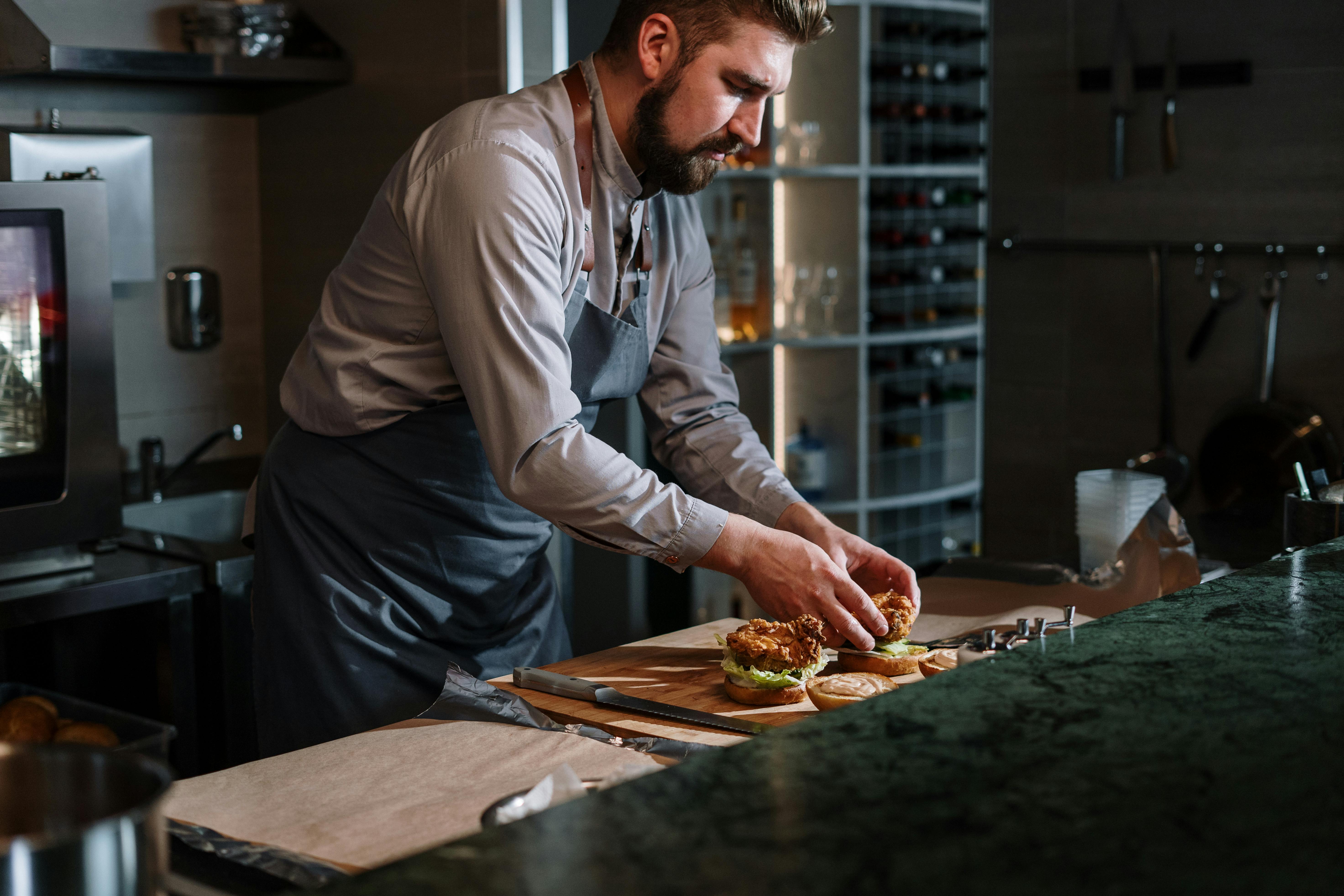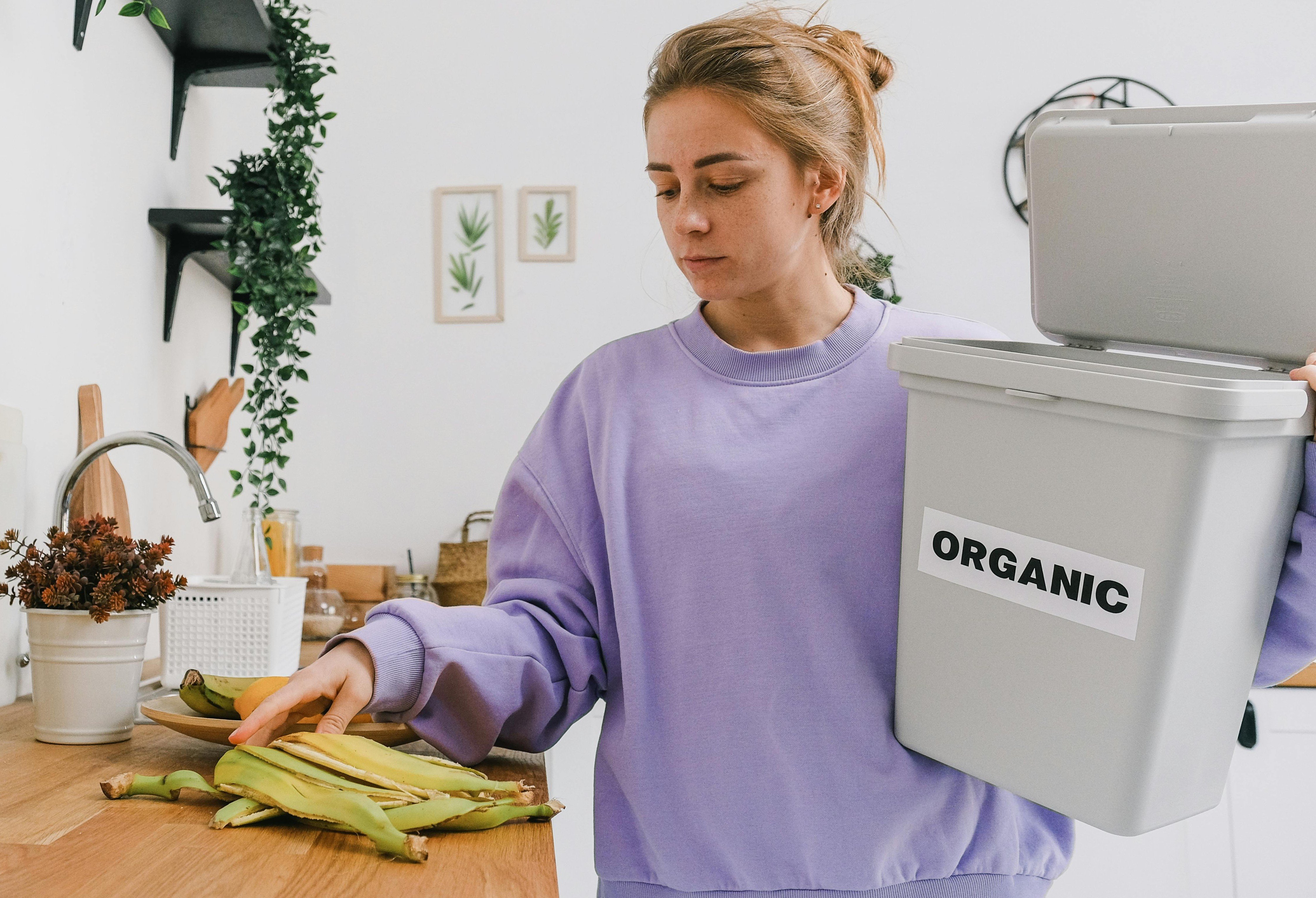If your business serves food, the way you throw it away has changed forever. Across the UK, food waste separation is now a legal requirement for most food-producing businesses. That means keeping food out of general waste bins and sending it for recycling instead.
2025’s updates to food waste regulations have been put in place to cut methane emissions, recover valuable nutrients and help the UK reach its net-zero targets.
When food goes to landfill, it breaks down without oxygen and releases methane, a greenhouse gas that’s far more powerful than carbon dioxide. Separating food waste keeps it out of landfill and turns it into renewable energy and compost.
Compliance doesn’t have to be complicated. With First Mile, you can stay ahead of the rules, cut waste costs and boost your business’s sustainability performance. We already help thousands of UK businesses recycle food waste quickly, cleanly and with zero to landfill.
The 2025 food waste laws – what’s changed and where
Food waste rules have now changed right across the UK, and the goal is simple: stop organic waste from going to landfill and move towards a circular economy.
Here’s what’s happening where:
England
- Since mid-2025, all food-producing businesses must separate food waste for collection.
- This includes restaurants, schools, caterers and manufacturers.
- Micro-businesses (fewer than 10 employees) have until 2027 to comply.
- The Environment Agency will monitor compliance and can issue fines for repeated breaches.
- These food waste regulations are part of the government’s wider plan to improve recycling rates and cut emissions.
Wales
- Since 2024, any site producing more than 5 kg of food waste a week must separate it for recycling.
- The Welsh government sponsored body, Natural Resources Wales, enforces this rule.
- Most Welsh councils already offer separate collections, helping businesses stay compliant.
Scotland
- A national organic waste landfill ban comes into full effect on 31 December 2025.
- The law stops biodegradable municipal waste, including food, from being sent to landfill.
- Businesses are expected to finalise compliance plans well before the deadline.
UK-wide target
- Across the UK, governments are working towards ending all biodegradable waste to landfill by 2028.
- This applies to hospitality, education, retail and manufacturing sectors.
These changes are not optional. Businesses that ignore them could face audits, penalties and reputational risks. Acting now ensures that your business remains compliant, reduces disposal costs and delivers a clear sustainability story to customers and clients.
Why food waste separation matters
Separating food waste isn’t just for the sake of following the law. It’s one of the most effective ways to cut your carbon footprint and support the UK’s climate goals.
When food waste goes to landfill, it breaks down without oxygen and produces methane, a greenhouse gas that traps heat 25 times more effectively than carbon dioxide.
One tonne of food waste in landfill can emit more than 600 kg of CO₂e. Multiply that by the millions of tonnes of food wasted each year, and the impact is huge.
By following the food waste law, your business helps:
- Reduce methane emissions by keeping food waste out of landfill.
- Recover valuable resources through recycling and composting.
- Generate renewable energy via anaerobic digestion (a process that breaks down organic waste to produce biogas and fertiliser).
- Support the circular economy by returning nutrients to the soil instead of losing them as landfill gas.
Food waste separation turns a problem into a solution. With First Mile’s food waste recycling for businesses, you can reduce the unnecessary cost of sending food waste to landfill and stay compliant with the law. It’s a simple switch that also helps your business move towards net zero.

How landfill bans and separation rules work together
The UK’s organic waste landfill ban and new separation laws are designed to work hand in hand. Both aim to keep food and other biodegradable materials out of landfill.
When food waste is separated at the source, it can be collected cleanly and sent for recycling. This prevents it from being mixed with general waste and ending up in landfill. It also supports national goals for zero biodegradable waste by 2028.
Scotland’s landfill ban, which began in 2025, was a key milestone. England and Wales are expected to follow with wider landfill restrictions over the next few years. Together, these steps will change how the UK handles food and organic waste for good.
Other European countries are already showing what works:
- France has compulsory composting rules for households and businesses.
- Denmark uses biowaste systems to turn food scraps into energy and fertiliser.
Landfill bans create strong demand for better food waste recycling for businesses. They also encourage investment in anaerobic digestion plants and composting facilities, helping the UK build a stronger circular economy and reduce emissions.
What businesses should be doing now
If your organisation produces food waste, now is the time to act. The new food waste regulations apply to most sectors, including hospitality, education and food manufacturing. Getting ready is easier than you might think.
Follow these simple steps to stay compliant:
- Audit your waste
- Find out how much food waste your business produces and where it comes from.
- Record typical sources such as prep waste, plate waste and expired stock.
- Segregate at source
- Set up dedicated food waste bins in kitchens, canteens and prep areas.
- Keep them clearly labelled to avoid contamination with packaging or liquids.
- Educate your team
- Run short training sessions so staff know what goes where.
- Use clear signage to keep everyone on track.
- Schedule regular collections
- Use a licensed carrier like First Mile for reliable food waste recycling.
- Choose a schedule that matches your waste volumes to keep costs down.
- Track and report progress
- Keep simple records to show compliance in audits.
- Report volumes as part of your sustainability data.
Examples in action:
- A restaurant installs new kitchen bins and cuts general waste costs by 30%.
- A school works with caterers to collect plate scrapings for recycling through anaerobic digestion.
At First Mile, our national collections and zero-to-landfill commitment make it easy to stay legal, reduce costs and show progress on sustainability. Schools can also book regular school food waste collections with First Mile to stay compliant and keep kitchens running smoothly.

What happens to separated food waste
Once collected, your food waste recycling begins a new journey. Instead of being sent to landfill, food waste is transported to an anaerobic digestion facility. This is a process where micro-organisms break down organic material in sealed tanks without oxygen.
Here’s what happens next:
- The process produces biogas, a renewable source of electricity and heat.
- It also creates a natural fertiliser called digestate, which is rich in nutrients and used on farmland.
- Both outputs help replace fossil fuels and chemical fertilisers, cutting emissions and improving soil health.
Food waste collected by First Mile is processed within the UK, keeping transport distances short and reducing carbon impact.
This closed-loop system is a great example of the circular economy in action. It keeps resources in use for longer, reduces waste and turns yesterday’s leftovers into tomorrow’s energy and soil nutrients.
With First Mile, your food waste does more than simply meet food waste laws. It helps power a cleaner, greener future for everyone.
Overcoming challenges and common pitfalls
Many businesses have already started food waste recycling, but some challenges still appear during rollout. Anticipating these challenges early helps you stay compliant with the food waste regulations and avoid extra costs.
Common issues:
- Contamination: non-food items like plastic cutlery or packaging ending up in food bins.
- Limited space: small or shared sites struggling to fit extra bins.
- Cost worries: fears that separate collections will increase bills.
- Lack of awareness: staff unsure about what counts as food waste.
Simple solutions:
- Use clear, colour-coded bin signage to show exactly what goes in each container.
- Give short refreshers to kitchen and cleaning teams every few months.
- Coordinate with suppliers to reduce unnecessary packaging.
- Review collection schedules to match your volumes and avoid overfilling.
First Mile helps businesses overcome these barriers with:
- Easy collection schedules that fit your site.
- Clear contamination guidance and training materials.
- Transparent pricing with no hidden extras.
With the right systems in place, hospitality food waste recycling and collections for schools or retailers can run smoothly. The result is less confusion, cleaner bins and full compliance with new laws.

The next phase – towards 2028 and zero biodegradable waste
The journey doesn’t stop with the Scotland 2025 landfill ban or England’s separation rules. Across the UK, governments are moving towards a bigger goal: zero biodegradable waste to landfill by 2028.
That means even more focus on food and other organic materials in the years ahead. We can expect:
- Wider landfill bans covering all UK nations.
- Stronger enforcement and more inspections for non-compliance.
- New recycling targets linked to the UK’s net-zero strategy.
- Expansion of recycling systems to include items like coffee grounds and compostable packaging.
For businesses, this next phase is full of opportunity. By improving food waste separation systems now, you can:
- Save money on landfill charges.
- Strengthen green credentials and win sustainability awards.
- Build resilience as recycling laws evolve.
Treat food waste compliance as an ongoing improvement, not a one-time fix. The steps you take today will put your business ahead of future regulations and part of the UK’s zero-waste success story.
Ready to take the next step?
Food waste separation is now part of everyday business life in the UK. It’s a legal requirement, but it’s also a chance to make a real difference. By keeping food out of landfill, you cut methane emissions, recover useful resources and support national net-zero goals.
Compliance doesn’t have to be hard or expensive. With First Mile, you get simple collections, zero-to-landfill processing and practical support whenever you need it. You’ll also enjoy long-term savings and stronger sustainability performance.
Explore our full range of business recycling solutions to make sustainability simple across every part of your operations.
Join the thousands of UK businesses already recycling food waste with First Mile. Book your collection or request a free compliance check today to stay compliant, save money and protect the planet.


